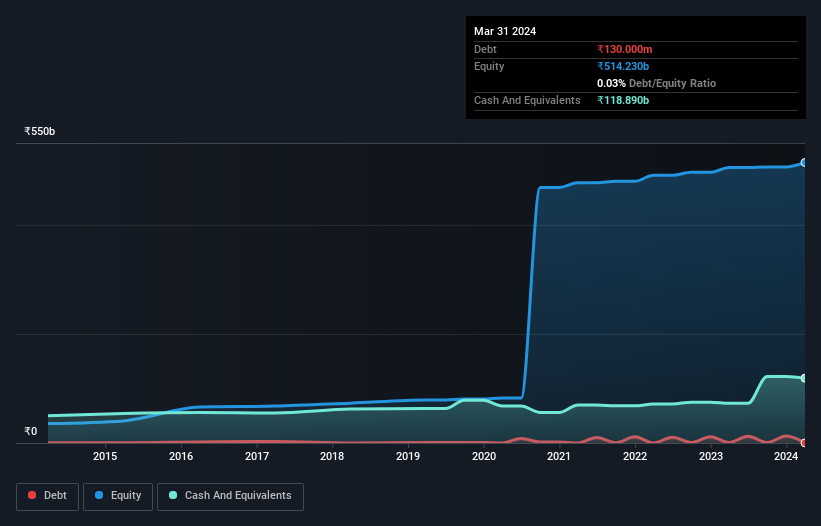- India
- /
- Personal Products
- /
- NSEI:HINDUNILVR
Hindustan Unilever (NSE:HINDUNILVR) Could Easily Take On More Debt

The external fund manager backed by Berkshire Hathaway's Charlie Munger, Li Lu, makes no bones about it when he says 'The biggest investment risk is not the volatility of prices, but whether you will suffer a permanent loss of capital.' So it might be obvious that you need to consider debt, when you think about how risky any given stock is, because too much debt can sink a company. As with many other companies Hindustan Unilever Limited (NSE:HINDUNILVR) makes use of debt. But the real question is whether this debt is making the company risky.
When Is Debt A Problem?
Debt assists a business until the business has trouble paying it off, either with new capital or with free cash flow. Part and parcel of capitalism is the process of 'creative destruction' where failed businesses are mercilessly liquidated by their bankers. However, a more usual (but still expensive) situation is where a company must dilute shareholders at a cheap share price simply to get debt under control. By replacing dilution, though, debt can be an extremely good tool for businesses that need capital to invest in growth at high rates of return. When we think about a company's use of debt, we first look at cash and debt together.
View our latest analysis for Hindustan Unilever
How Much Debt Does Hindustan Unilever Carry?
As you can see below, Hindustan Unilever had ₹130.0m of debt at March 2024, down from ₹980.0m a year prior. However, its balance sheet shows it holds ₹118.9b in cash, so it actually has ₹118.8b net cash.

How Healthy Is Hindustan Unilever's Balance Sheet?
The latest balance sheet data shows that Hindustan Unilever had liabilities of ₹128.8b due within a year, and liabilities of ₹142.0b falling due after that. On the other hand, it had cash of ₹118.9b and ₹35.6b worth of receivables due within a year. So its liabilities outweigh the sum of its cash and (near-term) receivables by ₹116.3b.
Having regard to Hindustan Unilever's size, it seems that its liquid assets are well balanced with its total liabilities. So it's very unlikely that the ₹5.82t company is short on cash, but still worth keeping an eye on the balance sheet. While it does have liabilities worth noting, Hindustan Unilever also has more cash than debt, so we're pretty confident it can manage its debt safely.
Fortunately, Hindustan Unilever grew its EBIT by 3.3% in the last year, making that debt load look even more manageable. There's no doubt that we learn most about debt from the balance sheet. But ultimately the future profitability of the business will decide if Hindustan Unilever can strengthen its balance sheet over time. So if you're focused on the future you can check out this free report showing analyst profit forecasts.
But our final consideration is also important, because a company cannot pay debt with paper profits; it needs cold hard cash. Hindustan Unilever may have net cash on the balance sheet, but it is still interesting to look at how well the business converts its earnings before interest and tax (EBIT) to free cash flow, because that will influence both its need for, and its capacity to manage debt. During the last three years, Hindustan Unilever generated free cash flow amounting to a very robust 80% of its EBIT, more than we'd expect. That positions it well to pay down debt if desirable to do so.
Summing Up
While it is always sensible to look at a company's total liabilities, it is very reassuring that Hindustan Unilever has ₹118.8b in net cash. And it impressed us with free cash flow of ₹140b, being 80% of its EBIT. So we don't think Hindustan Unilever's use of debt is risky. There's no doubt that we learn most about debt from the balance sheet. However, not all investment risk resides within the balance sheet - far from it. For instance, we've identified 1 warning sign for Hindustan Unilever that you should be aware of.
Of course, if you're the type of investor who prefers buying stocks without the burden of debt, then don't hesitate to discover our exclusive list of net cash growth stocks, today.
Valuation is complex, but we're here to simplify it.
Discover if Hindustan Unilever might be undervalued or overvalued with our detailed analysis, featuring fair value estimates, potential risks, dividends, insider trades, and its financial condition.
Access Free AnalysisHave feedback on this article? Concerned about the content? Get in touch with us directly. Alternatively, email editorial-team (at) simplywallst.com.
This article by Simply Wall St is general in nature. We provide commentary based on historical data and analyst forecasts only using an unbiased methodology and our articles are not intended to be financial advice. It does not constitute a recommendation to buy or sell any stock, and does not take account of your objectives, or your financial situation. We aim to bring you long-term focused analysis driven by fundamental data. Note that our analysis may not factor in the latest price-sensitive company announcements or qualitative material. Simply Wall St has no position in any stocks mentioned.
Have feedback on this article? Concerned about the content? Get in touch with us directly. Alternatively, email editorial-team@simplywallst.com
About NSEI:HINDUNILVR
Hindustan Unilever
A fast-moving consumer good company, manufactures and sells food, home care, personal care, and refreshment products in India and internationally.
Excellent balance sheet with proven track record and pays a dividend.
Similar Companies
Market Insights
Community Narratives




